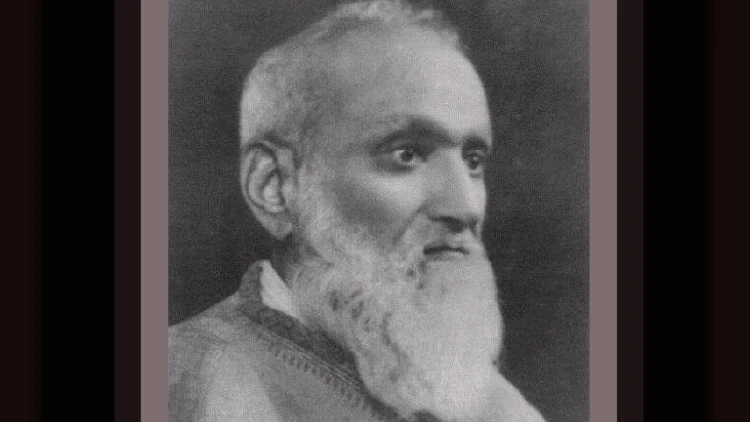
Saquib Salim
India won its freedom after almost two centuries of colonial rule in 1947. The freedom that we now take for granted today is the result of many a sacrifice. The present politics may have divided us into Hindus, Muslims, Sikhs, and castes to an extent that we tend to forget many freedom fighters whose ideals and teachings do not fall in line with the present political discourse.
Maulana Ubaidullah Sindhi is one such freedom who birth anniversary falls Saturday, August 21. Like many of his peers, he stands forgotten today in popular discourse. Does this name sound unfamiliar?
We have not read about him in school books, or in our magazines. Now, consider this: the Rowlatt Committee Sedition Report submitted in 1918, which led to the infamous Rowlatt Act, 1919, devoted three pages to describe the threat Maulana Ubaidullah Sindhi posed to the British Empire. The British saw Ubaidullah as the most ‘dangerous’ among the Indian revolutionaries of that time.
Born into a Punjabi Hindu family in 1872, Ubaidullah converted to Islam in 1887 after reading Tohfat-ul Hind. He adopted his name after the author of the book, Ubaidullah. At the time, Darul Uloom, Deoband in Saharanpur (U.P) was taking the lead in the nationalist movement.
The founders of the institution took an active part in the first war of independence in 1857 and were penalized by the British for the same. The search for Islamic knowledge took Ubaidullah to Deoband in 1889. Soon, he acquired the reputation of a scholar. Maulana Mahmood Hasan, the head of the institution, was also involved in the freedom struggle. Ubaidullah soon started learning about nationalist politics from this seasoned freedom fighter.
In 1899, Ubaidullah was instructed to return to Sindh and propagate the message of freedom. But as the first decade was ending Maulana Mahmood could foreseeing a war in Europe. The time demanded the formation of a militia. Ubaidullah was called back to Deoband in 1909 and under his leadership Jamiat-ul-Ansar, a militant organization of students of Darul Uloom was formed.
The vision was to not have a localized struggle but a pan-Indian war against the colonial government. In 1913, Maulana sent Ubaidullah to Delhi, where he worked closely with the Congress leadership. Soon, he made his name as a future political leader. However, in a fewf years, Ubaidullah got a new command. He was asked to leave for Kabul.
To avoid vigilance all this was kept highly secret. No written records were kept. One can imagine the extent of secrecy by the fact that Ubaidullah did not know anything about the mission for which he was transferred to Kabul. Ubaidullah had started liking the political environment of Delhi and did not want to leave. However he had to obey the order of Maulana Mahmood.
Ubaidullah wrote that, only on reaching Kabul in October 1915, he came to know that Maulana had been preparing the ground for war against the British from the soil of Afghanistan for five decades. Ubaidullah had been chosen as the commander of this plan. He could not believe that such an important work had been entrusted to him. Ubaidullah was a visionary who believed that Hindu-Muslim unity was the answer to all the problems India was facing. His Indianness was integral to his mission. In his view, Muslims should stop considering themselves a minority. The lack of inter-community dialogue was the reason for the mistrust between Hindus and Muslims.
In Kabul, he was welcomed by the Indian officers serving the Afghanistan government, who already knew of his mission. At the same time, another mission led by Maulana Barkatullah and Raja Mahendra Pratap reached Kabul from Germany with German and Turkish officials.
Ameer Habibullah, the ruler of Afghanistan, pledged his support to Ubaidullah. A provisional government, which according to the Rowlatt Committee Report was ‘devised’ by Ubaidullah, was formed at Kabul in 1915. Raja Mahendra Pratap was the President, Maulana Barkatullah was the Prime Minister and Maulana Ubaidullah Sindhi the Home Minister of this government. This government sent missions to countries like the USSR and Turkey to seek help for freedom for India.
An army with Maulana Mahmood as its Commander-in-chief and Ubaidullah as the General at Kabul was also proposed. However, before the plan was to be executed the British got a wind of it. Soon after, the war ended, and Germany and Turkey were defeated. Most of the people with Ubaidullah were either killed by the British or deserted him.
Now, Ubaidullah put his weight behind Hindu-Muslim unity and opened a unit of the Indian National Congress in Kabul, the first unit outside India. He toured different countries and later started living in Saudi Arabia, until his return to India in 1939.
Until his death in 1944, Ubaidullah believed that India could not afford different political organizations for Hindus and Muslims. In his view, the differences between the communities were not deep-rooted and a healthy dialogue would bridge them.
Saquib Salim is a Historian and a Writer
